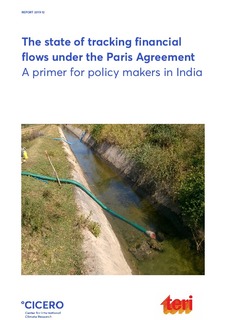| dc.contributor.author | Torvanger, Asbjørn | |
| dc.contributor.author | Dejonckheere, Sophie | |
| dc.contributor.author | Singh, Tamiksha | |
| dc.contributor.author | Pruthi, Aanchal | |
| dc.coverage.spatial | India | nb_NO |
| dc.date.accessioned | 2019-09-25T08:09:00Z | |
| dc.date.available | 2019-09-25T08:09:00Z | |
| dc.date.issued | 2019-09 | |
| dc.identifier.issn | 0804-4562 | |
| dc.identifier.uri | http://hdl.handle.net/11250/2618660 | |
| dc.description.abstract | The 21st Conference of Parties to the UNFCCC in 2015 saw international consensus on climate action through the adoption of the Paris Agreement. Article 9 focuses on mobilization and disclosure of climate finance. Drafting the rules for climate finance reporting has remained a contentious issue that has created a divide between developed and developing countries.
According to data compiled by UNFCCC, the face value of climate finance flows from developed to developing countries was at 75 billion USD in 2016. Developed and developing countries have, at times taken quite different views on definitions and best practices for categorizing and tracking climate finance. For example, a 2015 OECD and Climate Policy Initiative (CPI) report estimated climate finance from developed to developing countries at 62 billion USD in 2014. This estimate was strongly contested by an Indian report, which countered that new and additional finance was limited to 2.2 billion USD. This report argued that the methodologies used by OECD and CPI are inconsistent and lack transparency, with no independent verification or consultations with the developing country parties. This exchange sheds light on some of the key challenges faced by stakeholders hoping to track and report on climate finance.
With this context, the report aims to draw out some of the major challenges faced in tracking climate finance flows and discuss the major arguments in favour and against different positions, put in an Indian context. The report tries to compile this overview with the hope that it serves as a useful reference for government, policy makers and climate finance experts on recent developments and barriers for tracking climate finance. | nb_NO |
| dc.language.iso | eng | nb_NO |
| dc.publisher | CICERO Center for International Climate and Environmental Research - Oslo | nb_NO |
| dc.relation.ispartof | CICERO Report | |
| dc.relation.ispartofseries | CICERO Report;2019:12 | |
| dc.rights | Attribution-NonCommercial-NoDerivatives 4.0 Internasjonal | * |
| dc.rights.uri | http://creativecommons.org/licenses/by-nc-nd/4.0/deed.no | * |
| dc.subject | Climate finance | nb_NO |
| dc.subject | Tracking | nb_NO |
| dc.subject | The Paris Agreement | nb_NO |
| dc.subject | Challenges | nb_NO |
| dc.subject | India | nb_NO |
| dc.title | The state of tracking financial flows under the Paris Agreement - A primer for policy makers in India | nb_NO |
| dc.type | Report | nb_NO |
| dc.description.version | publishedVersion | nb_NO |
| dc.subject.nsi | VDP::Social science: 200 | nb_NO |
| dc.source.pagenumber | 22 | nb_NO |
| dc.identifier.cristin | 1728697 | |

